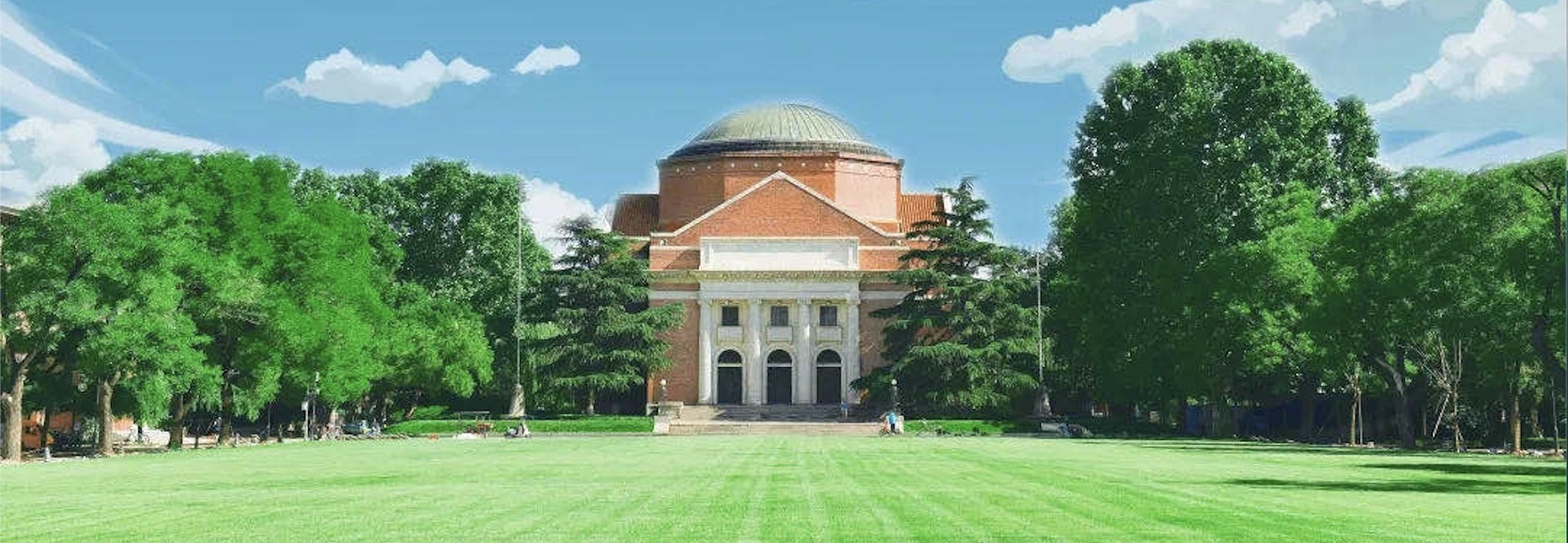Educators need to coordinate better to counter the simultaneous threats to journalism posed by digital transformations, social inequalities, misinformation, and the Covid pandemic, said Professor Yang Bin, provost of Tsinghua University, in his opening keynote at the 2022 Tsinghua Global Deans’ Forum.
The event on April 16 coincided with the 20th anniversary of the Tsinghua School of Journalism and Communication, with more than 25 deans from world-leading universities participating both by teleconference and at the Beijing campus.
“The Future of Journalism and Communication: Discussion on the Leading-Edge Issues of Education and Research” focused on three themes: Reorienting Global Journalism and Communication Education in the Post Pandemic World; Building Social Resilience with a Collaborative Global Research Network for Journalism and Communication; and Empowering Journalism and Communication Education with Intercultural Mindsets.
Professor Chen Changfeng, executive dean of the School of Journalism and Communication, noted that the 21st century has been plagued with uncertainty and rapid change. “We hope that our students and scholars can utilize the knowledge of journalism and communication to initiate a positive impact in the world where the evolving media ecology is bringing drastic changes in research and education,” she said. “Together, we can aspire for a better future in our education, academics respective community, and international agenda.”
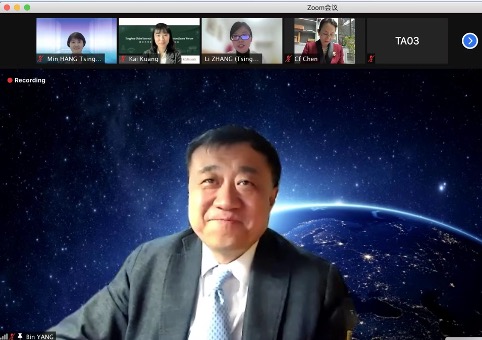
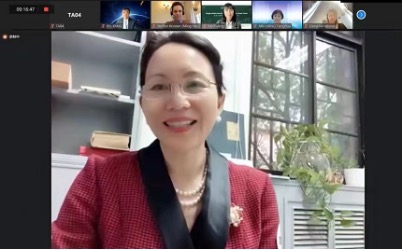
Professor Yang Bin (left) and Professor Chen Changfeng (right) delivered the opening remarks at the forum
To kick-start the forum and accommodate the difference in time zones, TSJC showcased congratulatory messages and contributions from four deans located outside China.
Professor Willow Bay, Dean of Annenberg School of Communication and Journalism at the University of Southern California, lauded the Master of Science in Communication Data Science dual-degree partnership between Tsinghua and USC. The first group of students from China arrived in Los Angeles last August to start their second academic year. Recent events show how interconnected the world is, said Professor Bay, adding that the pandemic highlights how stability requires dynamic collaboration and peoples’ resilience, innovation, and lasting achievements are born from agile partnerships.
Professor Fritz Cropp, Associate Dean for Global Programs at the Missouri School of Journalism, expressed in his video message both his congratulations and desire to develop collaborative programs with Tsinghua.
Professor Gerald Kato, Chair of the School of Communications at the University of Hawaii, said although the state of global news seems “unrelentingly bad,” he encouraged the audience of academics, students and media professionals to adopt the practice of “Solutions Journalism.” “Build social resilience by providing news audiences with timely, truthful and accurate information,” said Professor Kato, adding that the 20th anniversary forum was a testament to TSJC’s commitment to research and education.
Professor Cecilia Mello, University of Sao Paulo’s Dean of International Relations at the School of Communication and Arts, spotlighted her institution’s efforts to promote media literacy in schools and help teach young people to interpret and produce information. Media literacy is crucial to reorienting global journalism and communication education in the post-pandemic world.
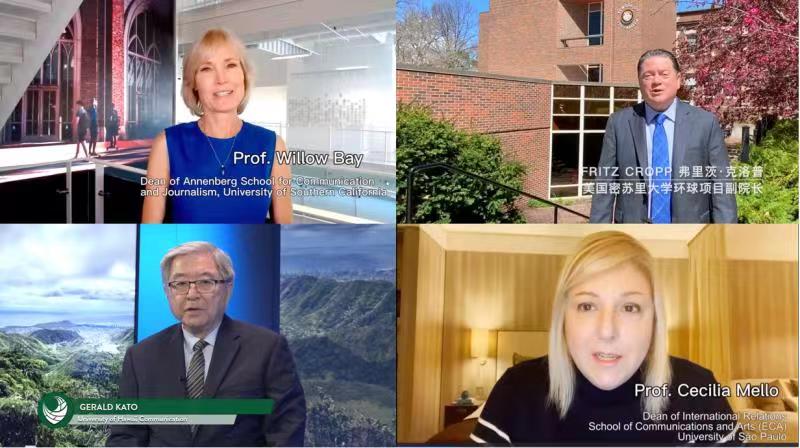
Theme I: Reorienting Global Journalism and Communication Education in the Post-Pandemic World
Professor Jeff Bezemer, head of Department of Culture, Communication and Media at University College London, called Covid-19 a case study for exploring the role of journalism and communication in shaping the opinions and behaviors of a society. Effective communication has lagged amid all the efforts curb the pandemic’s spread, with people getting mixed messages. “This is a weak spot that warrants more research,” he said.
Professor Chul-joo Lee, Chair of Department of Communication at Seoul National University, said communication education and research is often incoherent. A remedy to this weakness can be found through the adoption of neuroscience, solution-oriented and sociological approaches. Incorporating network science into education will “provide insight about human mind and behavior,” Professor Lee said.
Royal Melbourne Institute of Technology’s Dean of the School of Media and Communication, Professor Lisa French, focused her presentation on fact-checking, a “skillset in demand in journalism but that is more prevalent in newsrooms than in universities.” Professor French said her school has a six-year partnership with the Australian Broadcasting Corporation and jointly produces newsletters that debunk Covid-related misinformation, a hands-on way to boost fact-checking skills of students and media professionals.
Professor Terapatt Vannaruemol, Dean of Mass Communication at Chiang Mai University, noted that the pandemic has forced educators to better understand consumers’ behaviors and the impact on media audiences. His department in Northern Thailand has become more adept at analyzing the preferences of different generations, and students and faculty have been encouraged to be entrepreneurial with online platforms to create and curate their own content – especially those that deliver news and social content to youth.
Professor Liu Yu-li, head of City University of Hong Kong’s Department of Media and Communication, stressed the need for universities to collaborate and encouraged exchanges between professors, students and curriculums. She also said problems from the virus show the importance of persistence and flexibility. “When our students want to apply for internships in some cities and countries they face problems related to lockdowns,” she said. “Because of this, some companies and industry media have allowed students to have their internships online or hybrid.”
Bloomberg News Editor-at-Large Lee Miller, who is also a Professor at Tsinghua’s Global Business Journalism program, joined the discussion and shared how improved video technologies are cost-efficient in cultivating collaborations most scholars are seeking. He talked about how thanks to Zoom and Nexi, some of his students from as far away as Zimbabwe and Canada could have mentors from Bloomberg’s newsrooms in Beijing, Bangkok or San Francisco.
Professor Hu Zhengrong, Director of the Institute of Journalism and Communication at the Chinese Academy of Social Sciences, said the myriad of challenges related to politics, economic transitions and various models of government require creative thinking. Academia must embrace interdisciplinary research instead of doing research from an isolated tower.
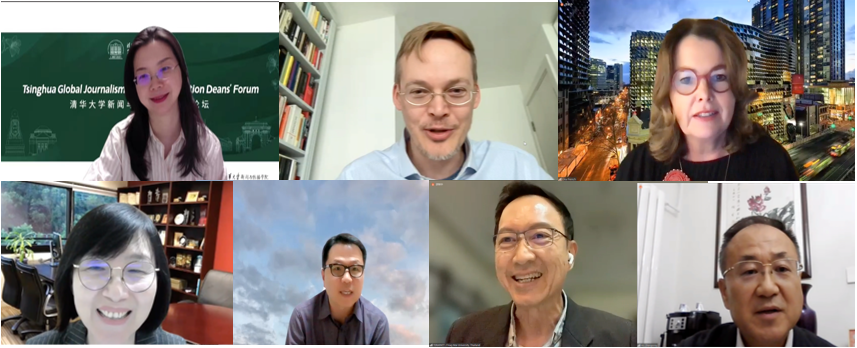
Guest speakers for the theme I discussion
Theme II: Building Social Resilience With a Collaborative Global Research Network for Journalism and Communication
For international collaborations to succeed, journalism and communication educators must cease “looking at ourselves as communications scholars,” said Shirley Ho, Associate Vice President at Nanyang Technological University. People must join forces with scholars outside their respective fields. The opportunities for such partnerships are plenty and they allow one to “look at problems in a much complex manner instead of the usual communications angle,” she said.
Professor Janet Jones, head of College and PVC, College of Design, Creative and Digital Industries at the University of Westminster, had similar sentiments and also cited the need for more independence. “It is timely for us to revisit the question of the value of journalism studies internationally and how we can collaborate effectively for everyone’s benefit,” she stated. “In the next 100 years, we need to influence our respective governments to regulate and support accurate journalism and public media devoid of ties to the state and commercial interests.”
Associate Dean for the Faculty of Arts and Social Sciences at the University of Technology Sydney, Professor Susie Khamis, said that resilience is a powerful resource -- especially when the world is reeling from one challenge to another. She added that her hope for social resilience “rests in the confidence that quality journalism will always find an audience.”
Professor Alongkorn Parivudhiphongs spoke about how the Department of Journalism at Chulalongkorn University in Bangkok is innovating. He said the school is committed to promoting a pluralistic society underpinned by the presence of exchange programs.
Discipline Chair of Media and Communications at Macquarie University, Professor Julian Knowles, raised concerns about the social effects of Artificial Intelligence, stressing that the new technologies reinforce the already existing inequalities. He advised academics to step out of their self-created bubbles that focus on scholarly papers, and to be more engaged and active in the wider communities.
Professor Francis Lee, Director of the School of Journalism and Communication at the Chinese University of Hong Kong, said the pandemic is a wake-up call for academics worldwide to rethink their research agenda since “contemporary societies are suffering from hyper pressure, distraction, and disconnection.”
Along similar lines, Professor Guo Ke, Dean of the Journalism School at Shanghai International Studies University, said new approaches are needed to invigorate social research. Efforts must come by working collectively more often at a global level with people from diverse interdisciplinary areas.

Guest speakers for the theme II discussion
Theme III: Empowering Journalism and Communication Education with Intercultural Mindsets
Showcasing its willingness to foster more diverse collaborations, TSJC extended an invitation to Professor John Durham Peters, Chair of Film and Media Studies at Yale University. Peters said journalists and those from other disciplines must be brave in their work, brainstorm on ways to communicate truth, and foster a “mindset endowed with humility.”
Professor B.J. (Jeroen) de Kloet, Head of Department of Media Studies at the University of Amsterdam, told the forum to avoid spotlighting digital media “as the only object of analysis.” Television and film cannot be regarded only as legacies, as TV has proved indispensable to help communities connect more broadly.
Matt Walsh, Head of the School of Journalism, Media and Culture at Cardiff University, said students need to be taught to listen more and strive to understand the backgrounds and thoughts of people they interview. He lamented on the lack of diversity in U.K journalism, where the profession is “overwhelmingly dominated” by white middle-class reporters. It’s difficult for stories to be inclusive if the story-tellers are “drawn from a narrow strata of society,” he said.
Professor Elena Vartanova, Dean of the Faculty of Journalism at Lomonosov Moscow State University in Russia, also lamented the lack of diversity, as she shared her views on how digitalization is widening the divide when it comes to access to information and visibility of consumers from ethnic groups who rely on their indigenous languages.
Professor Huang Yu, Dean and Chair Professor of the School of Communication and Film at Hong Kong Baptist University, proposed more intercultural exchanges to help people know others that may have different ideologies. Such encounters are crucial to narrowing polarized views and values.
The forum’s final panelist, Wei Lu, Dean of the College of Media and International Culture, Zheijiang University, cited Tsinghua’s 20th Anniversary Forum as an “example of empowerment” that transcended geographical locations and allowed people to “exchange thoughts and perspectives at a low-cost.”
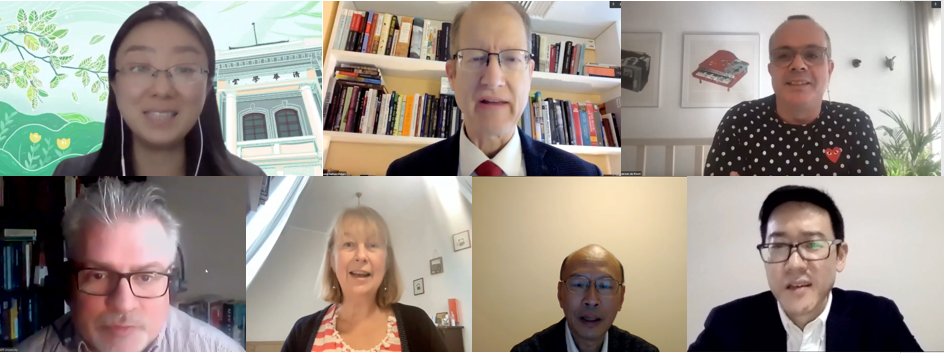
Guest speakers for the theme III discussion
The closing keynote was by Professor Zhao Yuezhi of the School of Journalism and Communication, who spoke about overcoming adversity to collaborate globally.
“The forum is a testimony of the Tsinghua School of Journalism and Communication’s success and fulfilment of its global vision and internationalization efforts,” she said. It’s also “testimony to the international scholars community’s commitment to international collaboration and a chance to promote solidarity.”
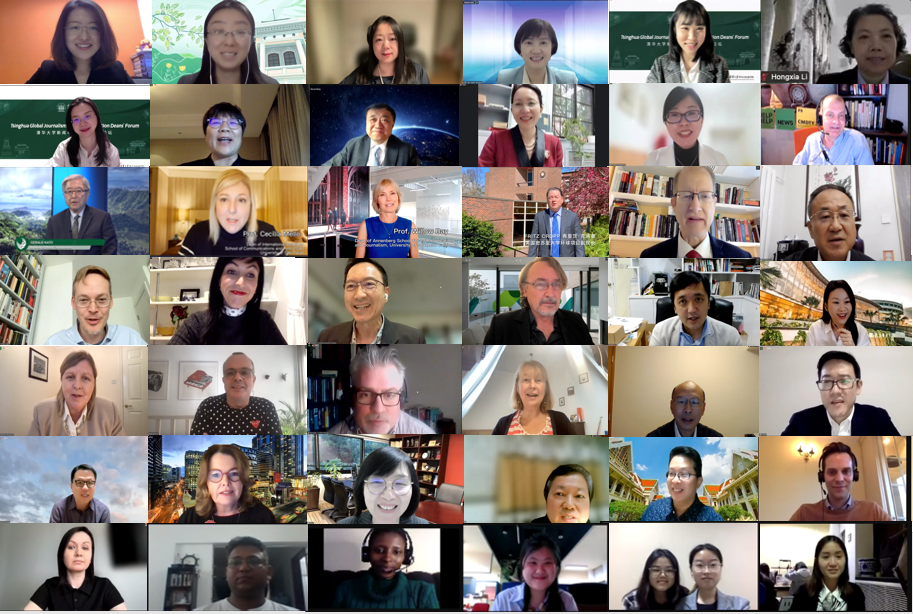
By Charity Nyarayi Matizanadzo
